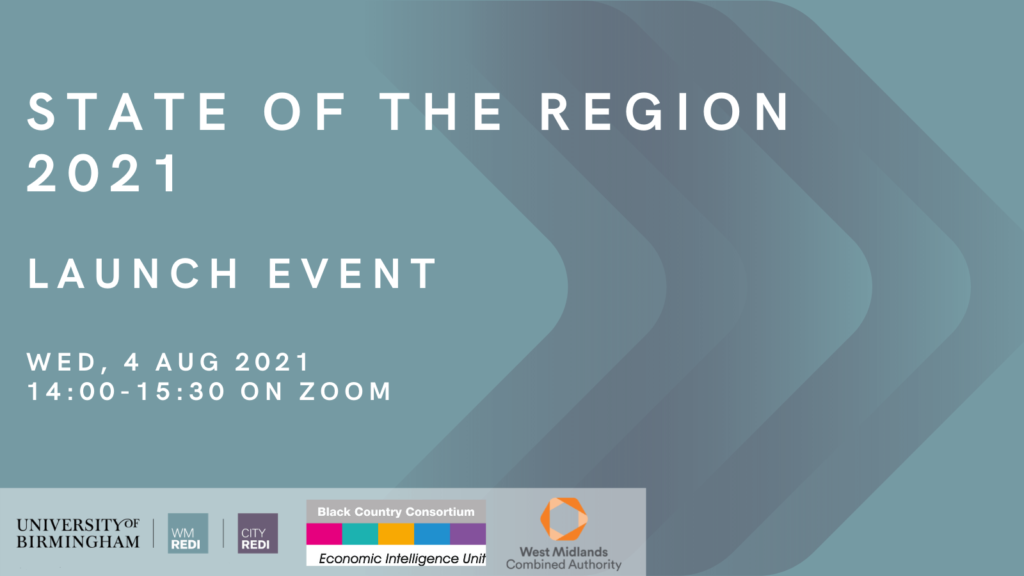 This year we are launching the fifth annual review of the State of the Region 2021 looking at how the region has fared in the last 12 months. We are launching the report and the West Midlands Data Lab and highlighting some of the research and data which has been ongoing over the last 12 months.
This year we are launching the fifth annual review of the State of the Region 2021 looking at how the region has fared in the last 12 months. We are launching the report and the West Midlands Data Lab and highlighting some of the research and data which has been ongoing over the last 12 months.
Register for the event – 4th August 2021, 14:00 – 15:30
This report is written on behalf of the West Midlands Combined Authority (WMCA), and all its partners, by the WM REDI partnership. It should be seen as a stocktake of where the region stands, it’s a snapshot of how the region is doing and where partners need to work together to improve the region. But this year, as last, it is still produced in extraordinary circumstances and it’s a call to action for everyone invested in the West Midlands (View last year’s report).
The State of the Region is a high-level report in comparison to its predecessors due to the wealth of research and supporting reports published throughout the pandemic. As in previous years, the report highlights the major challenges facing the region, its citizens and businesses and the challenge facing all bodies charged with improving the wellbeing, economy and environment. It is important to note this report was written in June 2021 and that some of the data included changes on a weekly basis. The latest data will be found in the weekly monitors as circumstances unfold.
This report endeavours to be an honest reflection of the current regional conditions, specifically highlighting the challenges faced in the next 12 months. However, the report is not attempting to suggest what the solutions are or whose responsibility it is to deliver them; this lies within strategies and action plans of all the regional partners, who own and deliver activities in the West Midlands. It is an executive summary as part of a suite of documents that highlights our evidence base and continuing to build our understanding of the performance of the region. There are challenges to understanding this performance and how partners change places for the better, not least understanding the causation and causality between action, output and outcomes. This document provides a balanced approach to regional monitoring and a useful tool to understand the progress the region is making through our combined action.
Agenda
14.00 – Welcome and introduction to WM REDI – Professor Richard Black, Pro-Vice-Chancellor, Head of the College of Social Sciences, University of Birmingham
14.10 – The purpose of the State of the Region and how it informs decision making – Julia Goldsworthy, Director of Strategy, West Midlands Combined Authority
14.20 – Overview of this year’s State of the Region – looking back and challenges going forward – Rebecca Riley, Administrative Director, City-REDI /WM REDI, University of Birmingham and Head of Research and Office for Data Analytics (ODA), WMCA
14.35 – Evidence to support our understanding – The Skills Advisory Panel Report Evidence Base – Alex Smith, Senior Data Analyst, WMCA
14.50 – Megatrends and future of cities – Professor Anne Green, City-REDI / WM REDI, University of Birmingham
15.00 – Launch of the West Midlands Data Lab Hub – Professor Delma Dwight, Director, Midlands Engine Observatory and Director of Economic Intelligence, Black Country Economic Intelligence Unit
15.10 – Panel discussion on “Post COVID and post-Brexit future – Challenges facing the region in the next 12 months” – Panellists TBC, Chair: Professor Simon Collison, Director of City-REDI / WMREDI and Deputy Pro-Vice-Chancellor, University of Birmingham
15.25 – Close and wrap up – Professor Simon Collinson
15.30 – Ends
This is followed by a workshop on findings from 3 key WMREDI research projects done with the Industrial Strategy Council, LIPSIT and the Midlands Engine on devolution and levelling up. This event is invite-only. Please email B.Brittain@bham.ac.uk for any queries and an invite.
This blog was written by Rebecca Riley, Business Development Director, City-REDI / WM REDI, University of Birmingham and Head of Research and Office for Data Analytics (ODA), WMCA.
Disclaimer:
The views expressed in this analysis post are those of the authors and not necessarily those of City-REDI or the University of Birmingham.
